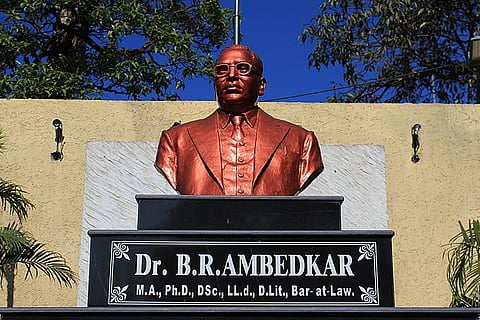
- Home
- न्यूजग्राम
- NewsGram USA
- India
- World
- Politics
- Entertainment
- Culture
- Lifestyle
- Economy
- Sports
- Sp. Coverage
- Misc.
- NewsGram Exclusive
- Jobs / Internships

Clouds of war still loom over the Himalayas. The seeds of this crisis were sown way back in the year 1949 when the Communists took over China by defeating the 'Nationalists'.
On the other hand, India too got independence in 1947 and since then has tackled a Chinese threat on its Himalayan borders along with a Pakistani threat on its Western borders. Looking at its historical relevance, a dive into the past becomes important in order to shape the outlook of the present times.
Dr. B.R. Ambedkar, who is known for his unabashed criticism of India's 'caste system' is very seldom quoted on economy and geopolitics. It was Dr. Ambedkar who had predicted a fallout with Communist China when Pandit Jawaharlal Nehru was talking about 'Hindi-Cheeni Bhai Bhai'. Pandit Nehru's non-aligned approach was criticized by Ambedkar who preferred better ties with a democratic United States than a communist China. Secondly, China's expansionist rampage after 1949 and the fall of Tibet is enough to say that Ambedkar had been proven right much before 1962 arrived.
The main area of contention between Pandit Nehru and Ambedkar was the age-old conflict of idealism vs pragmatism. As stated above, Ambedkar had already realized the impending danger when Pandit Nehru was romancing the Non-Aligned Movement.
"India must choose between parliamentary democracy and Communist way of dictatorship and come to a final conclusion."
Ambedkar during an addressal in Lucknow University, 1951
Ambedkar's outlook towards China was that of a person who knows that trying to have a straightforward friendship with his toxic neighbor would do more harm than good. The Chinese invasion of Tibet was ignored by the Indian government and the Communist regime was successful in propagating the false notion that the occupation was beneficial for the common Tibetans. However, the invasion was purely a strategic move by China. Furthermore, the occupation was a clear sign of impending disaster because the Chinese had reached India's borders and had a strong say in the Kashmir issue. This is the reason why Ambedkar was critical of Nehru's short-term policies.
Apart from his social impact, Ambedkar's views on China are still relevant. TIME magazine had called Ambedkar one of the first Indians to oppose Nehru and his policies on China. Had Nehru and his generals taken him seriously, 1962 could have been averted. However, one must give credit to Panditji for quickly learning from the shock and revamping India's Armed Forces on a massive scale. Had he not learned from the mistakes which led to 1962, India would not have defeated the Chinese in the 1967 border skirmishes. Apart from this incident, India went into a full-scale war with Pakistan in 1965 and 1971. In total, three major conflicts in ten years after 1962, and the Indian Armed Forces remained victorious. Surely, Pandit Nehru learned a lesson from 1962. And there is no doubt that it was an indirect outcome of the warnings that Ambedkar and Patel had put forward before passing away.
Today, China is not just a military threat but also an economic threat. The days of Mao Zedong are long gone. China has grown into an economic giant in stark contrast to Pakistan. Therefore, the Indian government must focus more on the Chinese problem by shifting its focus from Pakistan. Incidents like Doklam and Galwan are bound to happen again because of China's rise as a power and Xi Jinping's elevation to a paramount leader which makes the Chinese threat much more lethal than in 1962. (KB)
